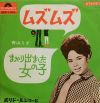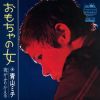Michi Aoyama
Michi ‘The Runaway Singer’ Aoyama (青山ミチ) was born on February 7, 1949 in Yokohama, Kanagawa, Japan as Fusako Yagi (八木 フサ子).
Michi Aoyama was the primary driver of a new 60s and 7-s era of music described as 'enka-blues'. Enka, which rose to popularity in the late 40s on the heels of imported US Jazz. Aoyama's song took the traditional enka forms and mixed it with more modern instrumentation and orchestration—and expressive growling vocals. The cover of an early Polydor single described Michi as “the female punk singer”—a decade before Britian would give birth to their version of punk rock.
Aoyama's father, Narcise Joseph Kerry, dated Michi’s then 16-year-old mother Kimako. After a brief courtship, Kimako moved in with Narcise, and in February 1949, they gave birth to their only daughter, known at birth as Fusako Yagi. Narcise and Kimako were said to have considered marriage, but because he couldn’t adapt to the culture of the country, or was unwilling to give it a real chance, he abandoned his Japanese family and returned to Texas two years later.
Fusako was a hāfu, but in the 50s in Japan, mixed children were called ainoko; an insulting term for the illegitimate offspring of foreigners. Life as an ainoko in post-war Japan was filled with hardship and resentment, and Michi was considered an outcast.
Early in 1961 Fusako won a local talent contest in a Tokyo jazz café and was scouted by a representative from the Polydor recording label. She was nicknamed Michie, “from the streets”, and changed her name to Michi Aoyama. Her debut recordings that year landed several beat-music hits on Polydor in the 60s.
Aoyama has a deep emotional voice, which was thought to have come from her deeper emotional distress, that was at least in part from growing up mixed in an era much less accepting as today. Aoyama was known to miss performances occasionally, due to her fragile state, and she was dubbed "The Runaway Singer" because of this fact.
Singles & EPs[edit]
| Image | Record | Label | Year |
|---|---|---|---|

|
ムズムズ / まかり出ました女の子 (7", EP) | Polydor SDR-1065 | 1964 |

|
おもちゃの女 (7", EP) | Crown LW-1220 | 1970 |

|
Compilation: ゴールデン☆ベスト アルバムアート (CD, Comp) | Crown CRCN-20315 | 2004 |
Aoyama was also an actress, known for he work in Stray Cat Rock: Machine Animal (1970), Bankaku: Kanto Sex Gundan (1973) and The Sunshine Girl (1963).
She died in January 2017 in Japan.
Best links: Discogs